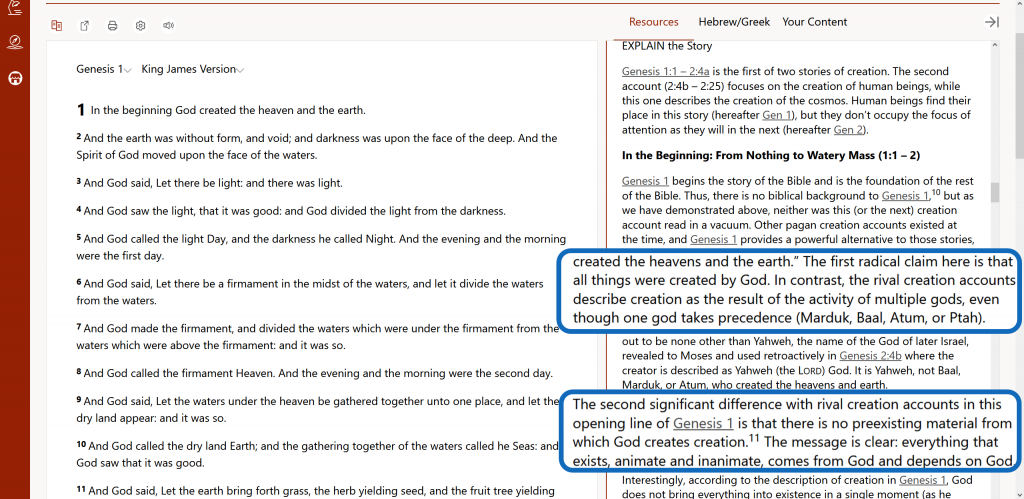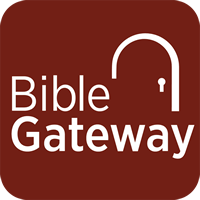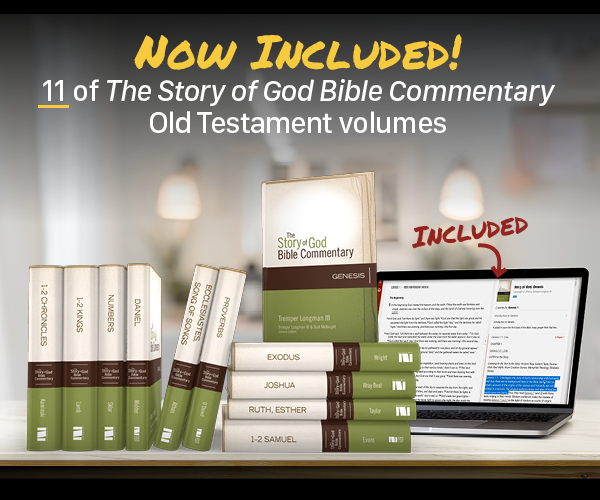“‘In the beginning God created the heaven and the earth.’ When I think there was a day when a human hand first wrote those words, I am filled with awe. This sentence is a masterpiece of compression. It approximates as closely as words allow the instantaneous realization of an intent, the bringing into being of the diversity of things that make up the world of fundamental human experience.”
— Marilynne Robinson
The words that open Genesis — and the Bible — are so well and widely known, it’s easy to overlook their incredible uniqueness and power. As Robinson, a world-renowned novelist and essayist, points out, nothing quite like them exist anywhere else in ancient literature.
The Story of God Commentary series, with 11 volumes from the Old Testament now available with Bible Gateway Plus, is the perfect resource to help understand the full impact of those words (and many more) with fresh eyes and ears.
As you study, you’ll find that the commentary on each passage is broken into three sections:
- “Listen to the Story” presents the Bible passage in the New International Version (NIV).
- “Explain the Story” examines the passage for its essential message and meaning.
- “Live the Story” explores how we can live this text in the world today. It offers insightful reflections, illustrations, and practical suggestions for daily Christian life and practice.
Let’s take a closer look at what “Explain the Story” highlights around Genesis 1:1. Two excerpts in particular reflect on what early pagans believed, how it differed from the account in Genesis, and how foundational these first few words are to our faith.

“The first radical claim here is that all things were created by God. In contrast, the rival creation accounts describe creation as the result of the activity of multiple gods, even though one god takes precedence (Marduk, Baal, Atum, or Ptah).”
“The second significant difference with rival creation accounts in this opening line of Genesis 1 is that there is no preexisting material from which God creates creation. The message is clear: everything that exists, animate and inanimate, comes from God and depends on God.”
We hope that this reinforces your beliefs and drives home how profound and life-altering these 10 opening words really are. To recreate this study with your Bible Gateway Plus membership, follow these steps:
- Search for Genesis 1 on BibleGateway.com.
- Click the Resources tab.
- Filter to Commentaries.
- Click the Story of God book cover to open the Resource.
- Scroll to the second article and click to expand.
- Then, scroll down until you find “EXPLAIN the Story” and continue reading.
As you deepen your study, we are pleased to provide the following volumes from this series to enhance your understanding of the Old Testament.
- Genesis
- Exodus
- Numbers
- Joshua
- Ruth, Esther
- 1-2 Samuel
- 1-2 Kings
- 1-2 Chronicles
- Proverbs
- Ecclesiastes, Song of Songs
- Daniel
Adding over $450 in value, while remaining less than $5/month, Bible Gateway Plus is the best value in Bible study with over $3,100 worth of resources.
Become a member today and learn more about The Story of God.









